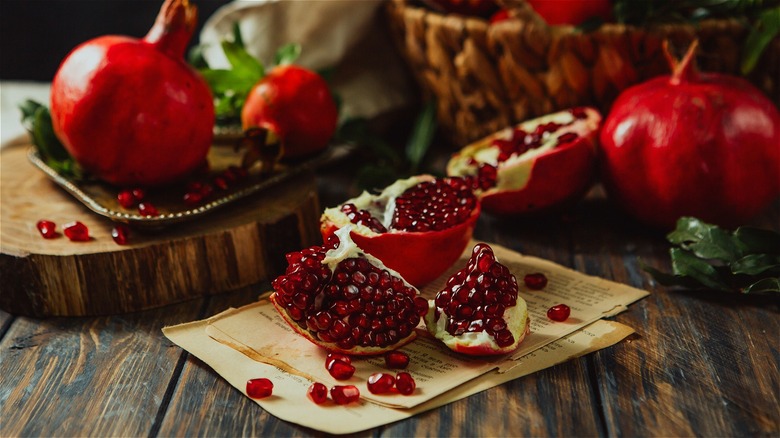Pomegranate Seeds Are Absolutely Meant To Be Eaten. Here's How.
Pomegranates may seem intimidating, especially if you've never tried cutting one open. Their tough, thick outer layer insulates hundreds of bright red juicy kernels that, at first glance, might make you question if they're actually edible. Not only are pomegranate seeds safe to eat, but they're the only part of the pomegranate fruit worth eating. They amplify midday meals like arugula, orange, and pomegranate salad and wild rice with pomegranate seeds and hazelnuts.
Pomegranate seeds aren't apple seeds; they're meant to be eaten. In fact, chewing pomegranate seeds is part of the fun. These colorful seeds' crunchy yet juicy texture makes them delicious and incredibly nutritious. Before we uncover easier ways to incorporate pomegranate seeds into your diet for taste and health purposes, let's get into its taste, texture, and how to deseed this wonderous fruit properly.
Eating pomegranate seeds is a multi-sensory experience
If you're ready to incorporate this bright fruit into your seasonal diet, finding the best way to remove these juice-filled seeds may be frustrating. To successfully do so, cut off the topmost bulb, score the fruit into six sections, and pull it apart in a bowl of water, allowing the vibrant seeds to easily detach from the tough outer skin. The actual seeds of a pomegranate are encased in bulbs of juice called arils. These springy translucent arils are what you see when you cut open a pomegranate.
When you pop an aril into your mouth, you'll first notice a bright gush of juice followed by a definite crunch. This distinct texture contrast comes from the actual pomegranate seeds within the arils, and those inner seeds are perfectly safe to consume. Pomegranates showcase a flavor profile similar to your favorite grape assortment with a slight sourness, like ripe cranberries. There are seemingly countless ways to incorporate pomegranate seeds into your diet.
Add pomegranate to your seasonal diet for innumerable health benefits
Pomegranates house a significant amount of healthy attributes, making them the perfect fruit to integrate into your seasonal eating regime. Healthline claims pomegranate seeds are known for being high in vitamin E, fiber, and a specific compound known as punicic acid. Based on one 2017 study, this polyunsaturated fat can decrease certain instances of severe medical conditions and inflammation in humans. Understanding the various health benefits of pomegranate seeds and finding easy ways to eat them will ensure you're reaping their vast nutritional qualities.
Among the many ways you can incorporate pomegranate seeds into your daily diet, using them as a garnish for your favorite salads, smoothies, and even oatmeal may be the most convenient. What makes pomegranate seeds versatile, though, is their ability to serve as a critical ingredient in sweeter dishes and savory meals. This means you can add pomegranate arils to your favorite ice cream and cheesecake and whip up a warm meal everyone loves, such as roasted pumpkin and sweet potato soup.
While pomegranates may seem intimidating, now that you know these juice-covered seeds are, in fact, edible and versatile, the next time they're in season, give one a try and see how this tart fruit can add a little zest to your everyday eats.


